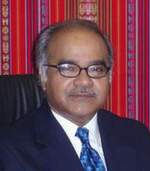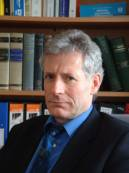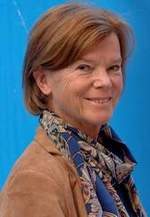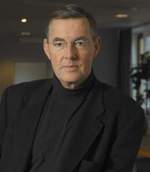|
|
PLENARY
SESSION
IN ASSOCIATION WITH UNDP TURKEY


MAIN SPEAKERS of
the PLENARY SESSION
The main theme of the ICSS:2008
will be Global Poverty Problem and Poverty Eradication. The
special session is being organized in association with UNDP
Turkey.
|
 |
DR. MAHMOOD AYUB
Dr. Mahmood Ayub
got his B.A. in Economics from Manchester University, England and
Ph.D in Economics from Yale University, United States.
Dr.
Ayub served for almost 30 years in various capacities at the World
Bank. His last assignment was as the Director of Strategy and
Operations for Africa. At the World Bank, he worked in the research
and strategy departments of the World Bank, but has also worked many
years in operations, including serving as the World Bank's
representative in Egypt and Bolivia. He
speaks six different languages, English, French, Spanish, Farsi,
Arabic (not fluent), Urdu and Pashto (mother tongue).
His research
interest is in macroeconomic policy, private sector development,
trade and capacity development issues. He has published widely on
poverty and
economic development issues.
Dr. Ayub is
serving as the UN Resident Coordinator and UNDP Resident
Representative for Turkey since September 2006.
|
| |

|
DR.
SELIM JAHAN
Dr. Selim Jahan is the Director of Poverty Practice in United
Nations Development Programme (UNDP). Prior to that, he was the
Senior Adviser and Cluster Leader, Strategies and Policies for
Poverty Reduction in the Bureau for
Development
Policy (BDP) between 2006 and 2007. He served as the Deputy Director
of the Human Development Report Office (HDRO) during 1996-2001 and
as a Policy Advisor in the HDRO from 1992-1996. During 1992- 2001,
he was a member of the Core Team that authored the Human Development
Reports.
Before joining UNDP in
1992, Dr. Jahan held different positions in universities, national
governments and other international organizations. He was a Lecturer
at the University of Dhaka and
McGill University, Canada and a Visiting Fellow,
School Of Public Policy, University of
Maryland. Dr. Jahan has served as
an Adviser, USAID, Dhaka, Bangladesh (1988) and as the Economic
Adviser, Planning Commission, Government of Bangladesh (1989-90). He
has also worked as a Consultant and an Adviser to various
international organizations including ADB, ILO, UNDP, UNESCO, the
World Bank and numerous NGOs including Grameen Bank, BRAC, and CARE
during the 1980s and the early 1990s. He holds a Ph.D in
Economics from McGill University, Montreal, Canada.
He has a M.A. in Economics and a B.A. (Honors) in Economics with a
First Class in both from University of Dhaka, Bangladesh.
|
| |
 |
DR. ALAN
DOIG
Alan Doig is a Professor
of Public Services Management at the Teesside
Business School. His areas of consultancy, teaching and
research are public services management, where he specialises
in the impact of change and the issues of
governance, and fraud management where he focuses on the
operational and organizational issues relating to prevention,
detection and investigation of fraud and
corruption. His research has included over 40 National
Integrity System [NIS] country reports for the Dutch and UK
governments. His consultancies are concerned
with national anti-corruption strategies, managing
anti-corruption agencies and local government anti-corruption
work in the Middle East, Africa and East
Europe. He was a member of the Group of Specialists on Public
Ethics at Local Level, Steering Committee on Local and
Regional Democracy, Council of Europe,
responsible for the Model Initiatives Package On Public Ethics At
Local Level. He has been Policy Fellowships
group advisor for the "Democratic Governance,
Transparency and Accountability" team of fellows in the 2005-2006
program funded by the Open Society Institute.
He was lead consultant editor of the Technical Guide to
the United Nations Convention Against Corruption [UNCAC]. Alan Doig is
currently a Council
of Europe long-term advisor to the Turkish government's
Ethics Council, based in Ankara.
Professor Doig
will be speaking on
poverty eradication, the donor poverty
agenda, aid, corruption
and institutional reform in failing or failed states
at the ICSS.
|
MAIN SPEAKERS of
the SPECIAL SESSION
The Topic of the
Special Session: The Problems of the Welfare State
| |
 |
DR.
BIRGITTA SWEDENBORG
Dr.
Birgitta Swedenborg is an economist and former vice President and
Research Director, Center for Business and Policy Studies (SNS) in
Stockholm, Sweden. Before that she was vice President of another
Stockholm-based research institute, the Industrial Institute for
Economic and Social Research (IUI). Her research has ranged from
topics in international trade, particularly the role of
multinational companies, to welfare state issues and political
economy, including constitutional political economy. She has served
as an expert on many government studies and was a member of the
Economics Commission, a special commission of academics appointed by
the Swedish government to analyze the causes and cures of Sweden’s
severe economic crisis in the early 1990s. She was also co-director
of a major US-Swedish research project on the Swedish welfare state
and a follow-up of that study, organized by SNS and the National
Bureau of Economic Research (NBER) in the US. Among her published
work are The Multinational Operations of Swedish Firms (1979),
Turning Sweden Around with Assar Lindbeck et al. (1994), The Welfare
State in Transition with Richard Freeman and Robert Topel (1997) and
Democratic Constitutional Design and Public Policy with Roger
Congleton (2006).
|
| |
 |
DR. HANS TSON SÖDERSTRÖM
Hans Tson Söderström received his PhD from the SSE in 1974
and was appointed Docent at the school in 1978. From 1970
until 1984 he was Research Fellow, Senior Fellow and finally
Deputy Director at the Institute for International Economic
Studies at Stockholm University. Between 1985 and 2002 he
served as President and CEO of SNS – the Swedish Center for
Business and Policy Studies. In 2004 he returned full time
to SSE to become President and CEO of the school’s executive
education branch. After the merger with IFL in 2005 he
served as Chairman of the Board of the merged company until
June 2007. He is now Senior Advisor to the SSE. He is also
Vice Chairman of the Jan
Wallander
and Tom
Hedelius
Research Foundation.
Since 1992 Hans Tson Söderström has served part time as
Adjunct Professor of macroeconomic analysis and policy in
the Department of Economics at Stockholm
School of Economics.
Professor
Söderström’s main area of interest is macroeconomic policies
in small open economies.
With Martin Flodén he is engaged in a research project on
“Macroeconomic policy in aging and globalized economies”.
He will deliver a paper entitled "The
Nordic Model - embracing globalization and sharing risks"
at the ICSS. |
|
|
|
|



